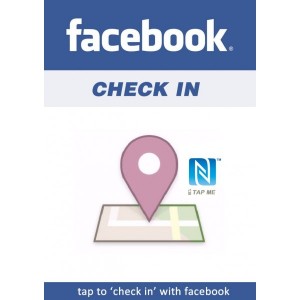Checking In: Predictive Analytics on Facebook
Whenever I visit my father in Kansas City, he always checks me in everywhere we go together. So if we go out to dinner or to an event, Facebook shows exactly where we are and how long approximately we stayed there. Often he’ll even include captions describing why we went there, or what he thought of it. I don’t like checking myself in to places – or at least not specific ones. If I’m visiting a new city or country, sometimes I’ll just check myself in to “London” or “Denver” or “Los Angeles” without ever specifying the restaurants and specific locations.
But regardless of the specificity of the check-in, all of this data could be used not only to track me but also to more effectively advertise to me. The places and locations I check into say a lot about my interests and personality, information that businesses could easily use to target me directly and effectively. Further, by checking in to a certain number of places, it can be seen that I enjoy traveling, perhaps, or alternatively am a homebody. Either way, I can be targeted for advertising and other businesses purposes.
I’ve known for a while now that individual consumers are often targeted – a process called micromarketing – to help sell items to people and populations that are specifically vetted by the company. Over time, the process of targeting is becoming more accurate, as methods of decoding big data become more advanced and sophisticated. I’m not sure how I feel about this yet. By participating in the services and communities that contribute to big data (like the internet), I am implicitly giving permission to be a part of it. And there are also potential ways to harness this data to target for positive purposes, perhaps for health reasons or other personal concerns. But the fact remains that I don’t really know where my data is going, and who has access to it, and that leaves me justifiably uncertain.
Whenever I see an ad that is specifically targeted to me (especially Facebook ads), I like to try to figure out why they chose me to advertise to. In some cases, it’s obvious – some product or event I liked on Facebook directly relates. But in other cases, when I’m not at all interested in the advertisement, it’s difficult to understand why I was chosen. Is it because of my age group and its usual preferences? Have many of my friends liked something and I was therefore associated with it? These questions are interesting ones to ponder.

 Previous Post
Previous Post Next Post
Next Post
I like how you mention that the process behind targeting and decoding are becoming more advanced and sophisticated. I too am somewhat uncertain about it–not as much about the process–but about how exhaustive and thorough it can be. I think the video about the Obama/Romney election we watched on Monday illustrates this perfectly. Being targeted and analyzed is one thing, but the extent to which it can be done is a little disconcerting
Yeah I agree, the specificity of predictive analytics can be startling, and as time goes on it’ll only get more and more sophisticated. I also see ads that just seem random to me and aren’t effective at getting me to buy the product, but I’m interested to see how that will develop in the future.